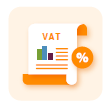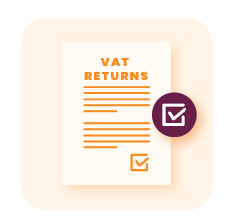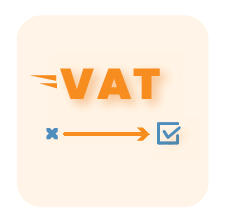VAT Returns & Recovery in Ireland
In Ireland, the majority of VAT-registered businesses are required to file their VAT returns bi-monthly, with the return periods ending in February, April, June, August, October, and December. Companies with an excess of input tax over output tax can opt for monthly filing of VAT returns to improve their cash flow.
Taxpayers with yearly VAT liabilities below EUR 3,000 have the option to file VAT returns every six months, while traders with annual VAT liabilities between EUR 3,000 and EUR 14,400 may be eligible to file their returns every four months.
Read more about VAT recovery and VAT returns in Ireland in our comprehensive guide.
Selling in Ireland?
Electronic Filing
Nearly all VAT-registered individuals are required to electronically file their Irish VAT returns and make VAT payments via the Revenue Online Services portal. The Irish Revenue Authority may waive the obligation to file and pay electronically if they decide that the taxpayer is unable to do so competently, but these circumstances are rare, and no definitive list of exempted taxpayers exists. In general, electronic filing is mandatory.
Payment Timing
Payment of VAT liabilities must be made by the deadline for filing the return in Ireland. Although the Irish Revenue Authority may accept payments outside of ROS in restricted cases, the Irish Revenue Authority is pushing for all taxpayers to use ROS. As a result, if taxpayers are unable to pay through ROS, problems may occur since the Irish Revenue Authority may refuse to accept payment made by any other method, and the taxpayer may be liable to interest and penalties for late VAT payment.
Interest and Penalties
Interest
In accordance with Section 114(1) of the VAT Act in Ireland, if a taxpayer fails to pay the correct amount of Value Added Tax (VAT) on time, interest will be charged on the underpaid amount.
The rate of interest charged is fixed by law at 0.0274% per day and cannot be subject to negotiation or adjustment.
Penalties
Under Section 116 of the Irish VAT Act, failure to pay VAT liability within a tax period may result in tax-geared penalties if the failure was due to deliberate or careless conduct. The amount of these penalties can add up to 100% of the unpaid VAT liability.
However, the severity of the penalties imposed may be lessened based on several factors such as the disclosure made to the Irish Revenue Authority, the timing of the disclosure, the taxpayer’s level of cooperation, and the category of default.
Additionally, non-compliance with certain VAT obligations may lead to fixed penalties of 4000 euros for each offense. These offenses are clearly listed in Section 115 of the VAT Act, and include failing to register within the given timeframe, submitting inaccurate VAT returns, and issuing invalid VAT invoices.
Download the Irish VAT Guide
VAT Recovery in Ireland
VAT is charged on the transaction value of a supply in Ireland, and there are no deductions for expenditures or other amounts. The overall amount of VAT payable to the Irish Revenue Authority during a VAT return period may, however, be lowered by input VAT, which refers to VAT expenses spent on specific transactions, according to Section 59 of the VAT Act.
To claim an input VAT credit in Ireland, the following conditions must be satisfied:
- The input tax should be related to the claimant’s taxable or deductible activities or to supplies made outside of Ireland that would be subject to Irish VAT if made in Ireland and are not for an exempt or private/non-commercial purpose.
- The claimant must possess adequate documentary evidence of the input tax paid.
- The input credit must be claimed within the designated timeframe.
A person who produces both deductible and nondeductible supplies can claim a portion of the input VAT paid on costs incurred in connection with their business activity and supplies.
Under the “dual-use” regulations stated in Section 61 of the VAT Act, input VAT that cannot be readily attributable to either category, such as overheads, can be recovered in part. The turnover method is the default method for computing the input VAT deduction for dual-use inputs, according to Section 61(4) of the Irish VAT Act, as amended. Nevertheless, an alternative method must be used in specific instances.
In the Irish VAT regime, input VAT should generally be claimed in the VAT period in which the relevant valid VAT invoice for the supply was issued for taxpayers using the invoice basis of accounting for VAT.
Last Updated: 04/10/2023
Disclaimer
The information provided by Global VAT Compliance B.V. on this webpage is intended for general informational purposes only. Global VAT Compliance B.V. is not responsible for the accuracy of the information on these pages, and cannot be held liable for claims or losses deriving from the use of this information. If you wish to receive VAT related information please contact our experts at support@gvc.tax








